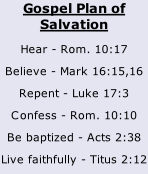In baptism there is a burial, an immersion in water. No other act would so fitly represent the complete ending of a life of sin. If there was no other source of knowledge as to how baptism was performed, this text should settle the matter beyond doubt. There is no burial in sprinkling and pouring a little water on a person's head, but there is a burial in immersion in water. Without going into a lengthy discussion of the subject, we call attention to three lines of evidence, each one independent of the others and each conclusive within itself.
The Lexicons - Thayer defines baptisma: "Immersion, submersion." Thayer is a recognized standard authority. As other lexicons agree with Thayer, it is useless to fill our limited space with quotations from them.
History - Concerning baptism in the first century, Mosheim says: "In this century baptism was administered in convenient places, without the public assemblies; and by immersing the candidate wholly in water." With this testimony other historians agree.
Circumstantial Evidence - If we could step back to the days of the apostles and see them baptize people, the matter would be settled. But we cannot be eyewitnesses to a first- century baptism. However, the circumstances connected with baptism then are so fully recorded that we should have no trouble in seeing that people were then immersed in water. Many a man has been convicted on circumstantial evidence less conclusive than can be presented in favor of immersion.
John the Baptist baptized the people in the river Jordan (Mark 1:5). If you notice the marginal reading in verse 9, you will see that John baptized Jesus into the Jordan. (See American Standard Version). John could have dipped Jesus into the Jordan, but he could not have sprinkled or poured him into the Jordan. And verse 10 says he came up out of the water. Later "John was baptizing in Ænon near to Salim, because there was much water there" (John 3:23). It does not require much water to sprinkle or pour, but it does require much water to immerse.
When Philip baptized the eunuch, they came to a certain water, they both went down into the water, the baptizing was done while they were in the water, then they came up out of the water (Acts 8:36-39). When people are immersed, they go to the water, the administrator and candidate both go down into the water, the baptizing is done while they are in the water, they then come up out of the water; but not so when people are sprinkled or poured. In baptism the body is washed in water (Heb. 10:22). The evidence is conclusive.
Add to this Paul's statement that we are buried in baptism, and assurance is made doubly sure, even though we did not know the meaning of the Greek word for baptism, nor what the historians, commentators, and critics say.
The New Life - Christ was raised from the dead by the glorious power of the Father; even so are we raised up from our burial in baptism to walk in newness of life, or in a new life. We begin to walk in the new life after we are baptized. We were baptized into death, and are raised to a new life. We are baptized into Christ, "in whom we have our redemption through his blood, the forgiveness of our trespasses, according to the riches of his grace." In Paul's language, redemption is forgiveness of sins. It is according to God's grace that we have the forgiveness of our sins in Christ, and not out of him. When a person is forgiven, there is nothing then against him. He then stands justified in God's sight--"being justified freely by his grace through the redemption (forgiveness) that is in Christ Jesus" (Rom. 3:24). But it is faith that leads us to be baptized into Christ, in whom we have forgiveness and consequent justification. It is by such faith that we are justified, and it is according to grace that it should be so. "For ye are all sons of God, through faith, in Christ Jesus. For as many of you as were baptized into Christ did put on Christ" (Gal. 3:26, 27). They were sons of God through faith in Christ Jesus, for their faith had led them to put on Christ in baptism. In baptism, therefore, we become closely united with Christ.
R. L. Whiteside, Commentary on Romans 6:4











